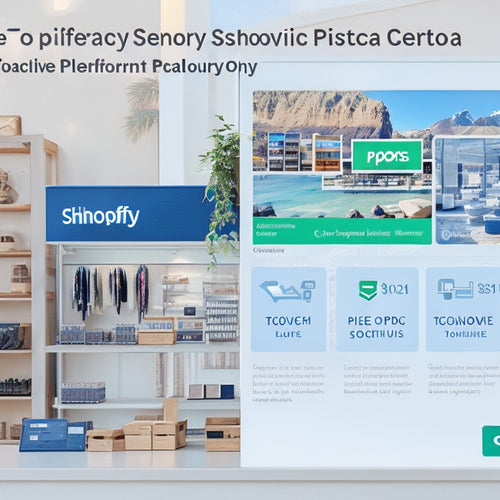
Enhance Your Shopify Store With Top Integrations in 2023
Share
In 2023, online retailers utilizing Shopify have the opportunity to enhance their e-commerce stores through the integration of various third-party applications.
Shopify is a widely adopted cloud-hosted platform employed by over one million e-commerce companies worldwide to effectively manage their products, customize their storefronts, track orders, and process payments. With its pre-built website templates and customization options, Shopify caters to both novice and experienced users.
The platform's robust reporting capabilities enable businesses to evaluate their performance, make informed decisions regarding marketing campaigns and inventory management, and ensure scalability and security through its hyper-scalable infrastructure and PCI DDS compliance. Integration with popular social media channels, advertising platforms, and analytics tools further enhances marketing capabilities and provides valuable insights.
Shopify offers flexible pricing plans, starting from $29 per month, and a 14-day free trial is available for users. By integrating various applications, Shopify users can streamline operations, enhance store design, optimize conversions, improve customer service, and efficiently manage products and inventory.
- Shopify offers a range of features and capabilities that make it easy to use and beginner-friendly, with no coding or HTML knowledge required.
- Powerful reporting tools provide detailed information about customers, revenue, and net profit, helping businesses evaluate performance and make informed decisions.
- Shopify offers scalability and security with hyper-scalable infrastructure and PCI DDS compliance, making it suitable for businesses of all sizes.
- Integrations with popular social media channels, advertising platforms, and third-party applications enhance the functionality and efficiency of Shopify stores, saving time and attracting new customers.
Benefits of Shopify Integrations
This discussion aims to explore the benefits of integrating Shopify with various third-party applications.
By enhancing the functionality and features of the platform, businesses can streamline their operations, improve the customer experience, and ultimately increase sales and revenue.
Additionally, seamless payment processing through Shopify integrations ensures secure and reliable transactions, simplifying the checkout process for customers.
Enhanced Functionality and Features
Enhanced functionality and features in Shopify integrations can greatly improve the efficiency and effectiveness of online stores. Integration customization options allow store owners to tailor their websites to their specific needs and preferences, creating a unique and personalized shopping experience for customers.
These customizations can include changes to the website's layout, design, and functionality, as well as the integration of additional tools and services. However, it is important to consider the impact of these customizations on website performance. Adding too many integrations or complex features can slow down the website and negatively affect the user experience.
Therefore, it is essential to carefully choose and optimize integrations to ensure optimal website performance while still benefiting from enhanced functionality and features.
Streamlined Business Operations
Streamlined business operations can be achieved through the integration of various tools and services in Shopify, allowing retailers to automate processes, manage inventory efficiently, and improve overall productivity.
By incorporating these integrations, retailers can experience improved efficiency and optimized workflows in their day-to-day operations. The automation of processes such as order fulfillment, inventory management, and customer service can save time and reduce errors.
With the ability to sync products from various sources, track inventory levels, and automate order fulfillment, retailers can streamline their inventory management and ensure accurate stock levels.
Moreover, the integration of customer service tools enables efficient management of customer inquiries and tickets, providing timely and satisfactory support.
Overall, these integrations in Shopify empower retailers to enhance their business operations, resulting in improved efficiency and optimized workflows.
Improved Customer Experience
Improved customer experience can be achieved through the integration of various tools and services in Shopify. This allows retailers to provide efficient customer support, personalized recommendations, and a seamless checkout process.
By incorporating these integrations, retailers can enhance user engagement and improve customer satisfaction. Efficient customer support tools like Gorgias and HelpCenter enable retailers to provide live chat support, manage customer inquiries and tickets, and offer self-service options and FAQs.
Integrations such as ReConvert and Vitals contribute to effective merchandising by upselling and cross-selling products, creating personalized product recommendations, and improving product presentation and showcase.
Furthermore, integrations like Privy and OptinMonster contribute to conversion optimization by capturing leads, reducing cart abandonment, and implementing exit-intent pop-ups and discount offers.
Through these integrations, Shopify empowers retailers to enhance the overall customer experience, resulting in improved customer satisfaction and increased user engagement.
Increased Sales and Revenue
Increased sales and revenue can be achieved through the utilization of various integrations in Shopify. These integrations allow retailers to optimize marketing campaigns, reach a wider audience, and generate more conversions.
By integrating Shopify with popular social media channels and advertising platforms, retailers can effectively advertise and market their products. This helps them reach a wider audience and increase brand visibility.
Integration with analytics tools like Google Analytics provides valuable insights into customer behavior and preferences. This enables retailers to refine their marketing strategies and target their campaigns more effectively.
Additionally, integrations such as Privy and OptinMonster help retailers capture leads and increase email subscriptions. This reduces cart abandonment and improves conversion rates.
Seamless Payment Processing
Seamless payment processing in Shopify is facilitated through integrations with popular payment service providers like PayPal and Stripe, ensuring secure and reliable transactions for customers. These integrations optimize the checkout process by offering a wide range of payment options and streamlining the payment flow.
Shopify merchants can accept various payment methods, including credit cards, digital wallets, and alternative payment solutions, providing flexibility to their customers. By integrating with trusted payment service providers, Shopify ensures that sensitive customer data is securely transmitted and stored, reducing the risk of fraud and unauthorized access.
Additionally, these integrations simplify the checkout process by eliminating the need for customers to enter their payment information manually, enhancing convenience and reducing friction. Overall, seamless payment processing in Shopify enhances the customer experience and contributes to increased conversion rates and customer satisfaction.
Tips for Choosing and Implementing Shopify Integrations
When it comes to choosing and implementing Shopify integrations, there are several key points to consider.
Firstly, it is important to have an integration compatibility checklist to ensure that the chosen integrations are compatible with your existing systems and processes.
Additionally, conducting thorough research on the integrations is crucial to understand their features, functionalities, and potential impact on your business.
Lastly, a seamless implementation process should be followed, accompanied by monitoring the performance of the integrations and keeping them updated to ensure optimal functionality.
Integration Compatibility Checklist
To ensure a smooth integration process, it is essential to carefully review the compatibility checklist when considering the integration of third-party applications with your Shopify store.
The compatibility checklist serves as a guide to assess whether a particular integration is compatible with your Shopify store's infrastructure and requirements. It includes factors such as the compatibility of the application's coding language, the availability of necessary APIs, and the compatibility of the application with the version of Shopify you are using.
Evaluating integration compatibility is crucial to avoid potential issues such as data conflicts, system crashes, or loss of functionality. Additionally, integration selection should be based on the specific needs and goals of your business.
Importance of Research
Research is a crucial step in the process of enhancing a Shopify store with top integrations. It allows store owners to make informed decisions and select the most suitable integrations for their specific needs.
Research strategies involve thorough examination and comparison of different integration options, considering factors such as functionality, compatibility, customer reviews, and pricing. Best practices for research include consulting reputable sources, reading user testimonials, and seeking advice from industry experts.
By conducting comprehensive research, store owners can identify the integrations that align with their business goals and requirements. This ensures that the selected integrations will effectively enhance various aspects of the store, such as design, merchandising, marketing, conversion rates, customer service, and inventory management.
Ultimately, research enables store owners to make informed choices and optimize their Shopify stores with the most beneficial integrations.
Seamless Implementation Process
The implementation process of integrating Shopify with various third-party applications is a seamless and efficient procedure. When considering the integration of third-party applications with Shopify, it is essential to follow an integration compatibility checklist.
This checklist ensures that the integration is compatible with Shopify's platform and does not disrupt the functionality of the online store. By adhering to this checklist, the implementation process can be smooth and error-free.
The benefits of a seamless implementation include saving time and money, reducing errors and eliminating data duplicates, making apps smarter and providing better insights, enhancing online store efficiency, and retaining and attracting new customers.
Overall, a seamless implementation process is crucial for successful integration and maximizing the benefits of third-party applications in the Shopify ecosystem.
Monitoring Performance and Updates
Monitoring performance and staying updated with integration changes are crucial aspects of managing a Shopify store. Constantly monitoring performance allows merchants to identify areas of improvement and make data-driven decisions. By analyzing key metrics such as conversion rates, traffic sources, and customer behavior, merchants can optimize their store for better performance.
Additionally, staying updated with integration updates ensures that the store is utilizing the latest features and functionalities. It is essential to regularly check for new versions, bug fixes, and security patches to ensure a smooth and secure operation. Shopify provides tools and resources to help merchants monitor performance and stay updated with integration changes, including performance dashboards, analytics reports, and notifications for updates.
Helpful Tutorials for Shopify Integrations
To gain a better understanding of how to effectively integrate Shopify with various third-party applications, it is recommended to explore a range of helpful tutorials available online.
These tutorials provide detailed step-by-step instructions and troubleshooting tips for seamless integration. They cover a wide range of topics, such as setting up API credentials, configuring webhooks, and managing app installations.
Additionally, these tutorials offer insights into best practices for optimizing performance and ensuring data accuracy during the integration process. They also address common challenges and provide solutions for resolving integration issues.
Learn More About Shopify Integrations
Shopify integrations offer numerous benefits and can greatly enhance the functionality of an online store. Understanding the best integration practices is crucial for maximizing these benefits.
By integrating with popular social media channels and advertising platforms, Shopify users can expand their reach and increase brand visibility.
Integrating with analytics tools such as Google Analytics allows for better tracking of customer behavior and enables data-driven decision-making.
The Shopify App Store offers hundreds of apps that can be easily integrated to add more functionality to the online store. These integrations save time and money, reduce errors and data duplicates, and provide better insights.
They also enhance the efficiency of the online store, retain and attract new customers, and improve the overall user experience.
Related Posts
-
Platforms for Shoppable Videos
This article explores various platforms that support shoppable videos, a growing trend in online marketing. Shoppabl...
-

Integration Shopify Apps Ensure Smooth Interoperability Between the Store and Various External Tools or Platforms Such as POS Systems and Crms
The integration of Shopify apps plays a crucial role in ensuring smooth interoperability between the store and vario...
-

Interactive Shopify Live Stream Shopping Apps for Enhanced Customer Experience
This article explores the use of interactive Shopify live stream shopping apps to enhance the customer experience. T...

